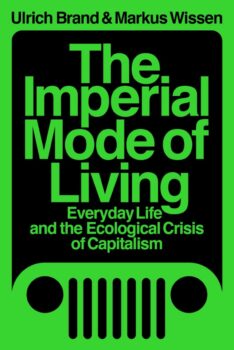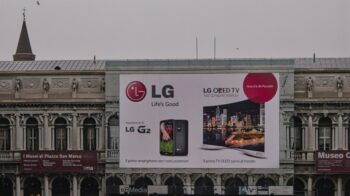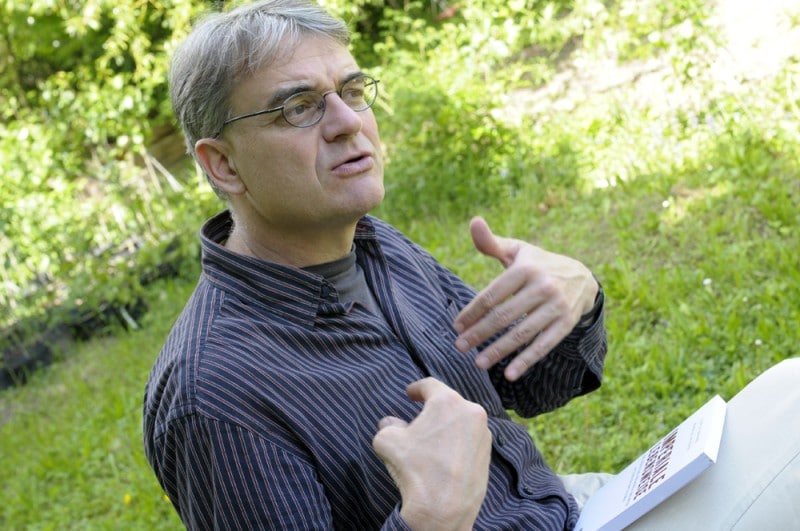In a giant overcorrection from the anti-consumerism era of No Logo and Adbusters, much of the “climate left” in the Global North now tends to dismiss any critique of resource-intensive consumption—driving and flying, factory farmed meat, smartphones—as reactionary, if not even “Thatcherite” or “Malthusian.” Focusing on consumption, the argument goes, distracts from immense capitalist power and profits, blaming the increasingly immiserated working class for conditions that we have no control over. This conclusion has been widely memeified: think of “no ethical consumption under capitalism,” the “Mister Gotcha” comic, or the (misleading) claim that a mere 100 corporations are “responsible” for 71 percent of emissions.
There’s some merit to this pushback, of course. Individualizing climate change and other environmental crises is a key strategy of capital, with the “carbon footprint” first promoted and popularized by BP as a way to diffuse the responsibility of fossil fuel producers. This reality seems only further confirmed every time we learn of a new situation of extreme capitalist waste, such as airlines running thousands of “ghost flights” during the pandemic to maintain airport slots, farmers dumping thousands of gallons of milk, or Amazon destroying millions of items of unsold stock. Capital is to blame, of course.
But when thinking about any kind of rapid and globally just transition, there’s an urgent need to assess the profound imbrication of resource-intensive consumption at the subjective level of conscious and unconscious desires. Countless things that are popularly understood and strived for as key components of a “good life” fundamentally depend on the ever-deepening immiseration of poor, colonized, and racialized peoples, especially in the Global South. Continued access to these material benefits has helped shore up capitalism and stabilize or displace its many crises and contradictions—until very recently, that is—with an “unstable equilibrium of compromise” enrolling subjects as active participants in its maintenance.
One of the most vital recent texts exploring this trend is The Imperial Mode of Living by German scholars Ulrich Brand and Markus Wissen. In contrast to the overly simplistic notion that capital unilaterally imposes consumption upon us, Brand and Wissen emphasize a dialectical analysis in which capitalist domination “draws on the wishes and desires of the populace … becomes a part of individual identity, shapes it, and thereby becomes all the more effective.” Canadian Dimensionspoke with Brand, professor for international politics at the University of Vienna, about the imperial mode of living, the dynamic nature of hegemony, and potential alternatives.
Canadian Dimension (CD): What is the imperial mode of living? Why is it a mode of living, rather than a lifestyle or way of life?
 Ulrich Brand(UB): The context when we started to work on it was the economic crisis of 2007-2008, where the climate crisis and the ecological crisis had a lot of attention but the specific crisis policies were old-school: supporting the car industry and not really pushing the mobility transition. We asked ourselves: why is the continuity so strong?
Ulrich Brand(UB): The context when we started to work on it was the economic crisis of 2007-2008, where the climate crisis and the ecological crisis had a lot of attention but the specific crisis policies were old-school: supporting the car industry and not really pushing the mobility transition. We asked ourselves: why is the continuity so strong?
We said, OK, there are obviously structures coming from critical theory and Marxism. It’s the mode of production. But what is the other side of the coin? There, we proposed the term “imperial mode of living” or “mode of living” in the sense that it has its own dynamics. We have to think about the mode of production, of course, which is class-based, power-based, globalization-oriented. But the mode of living is that people make sense or have material practices as everyday life.
It’s not a thing of choice, like “I want to have this living room or that car.” But people, with all their differences, are inscribed in a mode of living and mode of production that constantly refers to an elsewhere: to cheap labour and nature. The products and the commodities that people are consuming don’t indicate the conditions under which they were produced. In the smartphone, in the car, in the plane, in the industrially produced food there is this elsewhere—this exploitative relationship—inscribed.
CD: A central claim about the imperial mode of living is that it is exclusive, with contradictions only heightening as more people fight for access to it or refuse to continue bearing its costs. What is it about the imperial mode of living that makes it inherently exclusive and something that can’t be universalized?
UB: “Everyday life” is not a moralizing category, it’s a structural category. To understand this deeply embedded, unsustainable mode of living and mode of production, we necessarily need the other side of the coin: we need the destruction of land to exploit oil and gas—and now even worse with fracking. We need the workers in Bangladesh for the production of textiles. We need the workers in China for the production of cellphones. Against the economic orthodoxy that if there are high enough growth rates, there will be the famous trickle down effect and everybody will be better off along income and class dimensions, we argue, no: we need this other side of the coin.
However, coming from critical theory, we want to highlight dialectical thinking. It’s on the one hand exclusive but it’s also attractive. Even the exploited people, when they have a higher income and better status: they want to be integrated. They want to live the imperial mode of living. We see this with this enormous growth of meat consumption and cars in China. It’s attractive and exclusive. We want to understand and underline this and the invisibility of the preconditions: how nature is appropriated and destroyed, how other people and their workforce is appropriated.
CD: How are the benefits of the imperial mode of living further differentiated through various intersections of gender, race, and socioeconomic status?
UB: This is a very important point. We argue as a structural category, everybody is pulled into the imperial mode of living. We need to live the imperial mode of living. But there are differences because of exploitation within the Global North: there are migrant workers and poor working conditions for many, many people.
These inequalities exist mainly along income: it’s not so much the “ecological consciousness” but the income that produces the so-called ecological footprint or how we are integrated in the imperial mode of living. It’s also public infrastructure that’s produced with materials from the Global South. So we argue that it depends along race and gender because it’s part of the social division of labour. People of colour are usually more exploited: they have fewer chances for a career and good education so they’re stuck to a position within the social division of labour and usually gain less. It’s the same with the gender division of labour: there is a gender pay gap and very different opportunities for careers.
Besides the socialization and social division of labour, we also have consumption patterns that are very different. For example: the use of cars and who gets the larger car, in what Cara Daggett calls “petro-masculinity.” Even with electric cars: the huge Tesla car, almost looking like a tank. So it’s the division of labour and it’s the pattern of accepted consumption that has to do with status and masculinity. But again, it’s this ambiguous integration into society. A woman who earns more money and is part of the upper middle class or elite is very differently inscribed and attached to the imperial mode of living than a poor woman.
We argue that inequality is a precondition of the imperial mode of living and it’s a consequence. The imperial mode of living can be realized because we have this huge inequality, the exclusive character, the class and gender and race-based character. But the effect is also stabilizing social inequality. When we look at the Global North and South relation it’s even stronger.
CD: Another key aspect of the argument concerns the Gramscian theory of hegemony. Crucially, this often plays out at the level of unconscious desires, habits, and anxieties. How does a theory of hegemony help us understand the imperial mode of living and its lasting power, especially as it pertains to these unconscious desires?

An LG advertisement plastered on the side of Saint Mark’s Basilica in Venice. Photo from Flickr.
UB: Let’s start briefly with the split within the Gramscian use of the concept of hegemony. Usually, of course, it’s domination by consent: it’s the specific form of domination that was the great invention of Gramsci with class domination not just power and coercion but also the fabrication of consent. At least within Western Europe, there is the notion of hegemony and of civil society which was very much attached to “the public,” which is close to Jürgen Habermas and his theory. So “the public” is the form of contestation: it’s the form where the consent is produced.
We, coming from Marxism or historical materialism, argue no: hegemony is practiced in the everyday, consciously or unconsciously. So we have to think not only about the huge public debates: “How’s the energy transition working?” and so on. We have to look in a finer sense about how people make their living and what is attractive in it. Even Gramsci distinguished between active consent and passive consent. He said the active consent is usually the upper middle classes thinking: “This is great, we want to maintain our life.” The passive consent is: “I don’t have an alternative. I don’t want to be exploited or I don’t want to have a boring life but I don’t have any alternatives.” This is passive consent.
Our point is close, if you like, to Bourdieu’s concept of habitus: that this form of living—of desires—is corporealized. It’s part of our subjectivities and part of our body, our wish to have more. This is when it comes to the politicization or the critique of the imperial mode of living. It’s not only the great public debate and hegemony. Of course, we need protest movement, we need this debate. But it’s not enough. Those protest movements and debates should look also at what are the preconditions of people and of their living? It broadens the political perspective of alternatives quite a lot when we have this take of the Gramscian notion of hegemony.
CD: The imperial mode of living is contrasted with a potential solidary mode of living that works to shift subjectivities and social conditions through a radical transformation towards a global care economy. What are some of the key aspects of the solidary mode of living?
UB: To start with, we tried to argue with our book against a very dynamic treatment dealing with ecological crisis: what we call green capitalism, or the green economy, or ecological modernization of capitalism. Which is: we have a problem with the combustion engine so it should be the electric engine. This will not be sufficient, we know, because the resources have to come from the South and there is still the space problem.
We prepare our argument of solidary mode of living against a strong expectation of the green side of the government in Germany and Austria that we don’t have to question our imperial mode of living: we green it a bit. There’s a greening ecological modernization, if you like. I’m sure in Canada you have similar debates. Even many movements believed it; not the radical movements, but many NGOs and so on.
We argue: no, if we take the problem seriously: that we have to get rid of the capitalist growth imperative, that we have to get rid of the world resources market, this enormous flow from the South to the North. We need principles but also to take seriously experiences and then certain policies towards the solidary mode of living. This chapter is a first attempt. It’s very comprehensive and it was also criticized—which is why we’re writing another book.
But you point at a distinction which to us seems crucial: the distinction between the subjective preconditions and the objective preconditions. We don’t accept an environmentalist discourse that says “it’s just behaviour, it’s just the consciousness.” But we also don’t say, “it’s just the policy framework.” We say that if we want a real mobility transition, but only from the combustion engine to the electric engine, we need an understanding via conflicts and via learning processes that the car is not only not necessary but it’s not attractive. It’s a struggle over subjectivities that what we call the “automobile imperial mode of living” or “imperial automobility” is not any longer possible.
The objective conditions are the other infrastructures, the other production systems, which means also a loss of jobs. I work a lot with trade unions on this. A reduction of the car industry means to rethink how the production of mobility is organized and to take the power from the automotive industry and to produce much more the means for public transport. The argument from the automotive industry is always: “There is job loss.” And the unions are on their side. It’s necessarily to convince them to have good public transport—which does not mean planes but a good train and bus system—means also to create jobs. This is the subjective and objective.
Then, we have some principles. One principle, since we come from critical theory, is that the care principle—a principle to organize society carefully: to have care for yourself, for others, for nature, for society—should overrule the profit principle of the large companies. At the large scale of the automotive industry and military, the profit motive turns into political power. We have to reduce certain production but we also have to change property relations.
Another principle beside this care principle is to rebuild the public sector. Of course, we have many problems with the public sector. Corruption, inefficiency: we are aware of these things. But to guarantee basic provisioning, we need a strong public sector because this can be made responsible. When it comes to pensions, when it comes to health, when it comes to education, the private principle is “who has the money?” The public principle is that it’s a social right.
Finally, we argue that we need strong social movements, which are usually the indicators of the need of radical change. We have this wonderful movement in Germany to leave the coal in the soiland the anti-nuclear movement that has decades of experiences and work. At the end, it’s political contestation: it needs to be armoured—to draw on Gramsci—with coercion and the finances of the state. It needs a macro perspective. It’s not enough to remain within a niche. But we defend that the radical innovation usually comes from the edges. For example, we don’t argue “we have to wait until the majority wants it.” We need these starting points of an emancipatory politics, which means criticizing domination in a manyfold sense.
The major challenge we are working on now is to think of a solidary mode of living beyond the national scale. What does it mean to restructure world market flows and power: a very structural inequality? Often, a socialist or ecosocialist perspective is implicitly sticking to the nation state such as Canada or Germany. What we need much more is to think in very concrete steps about what it would really mean to get rid of or at least weaken an international and global division of labour that is reproducing the imperial mode of living.
This interview has been edited for clarity and length.
James Wilt is a freelance journalist and graduate student based in Winnipeg. He is the author of Do Androids Dream of Electric Cars? Public Transit in the Age of Google, Uber, and Elon Musk (Between the Lines Books) and the upcoming Drinking Up the Revolution (Repeater Books). You can follow him on Twitter @james_m_wilt.

